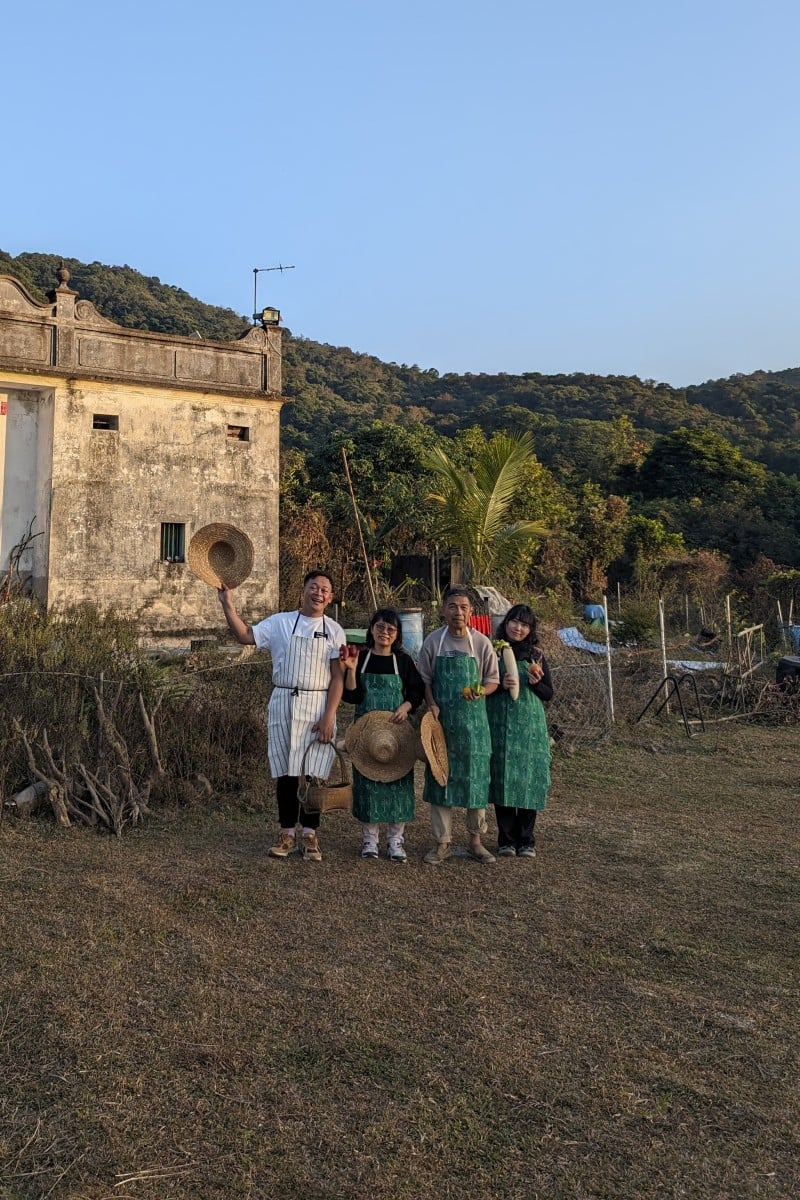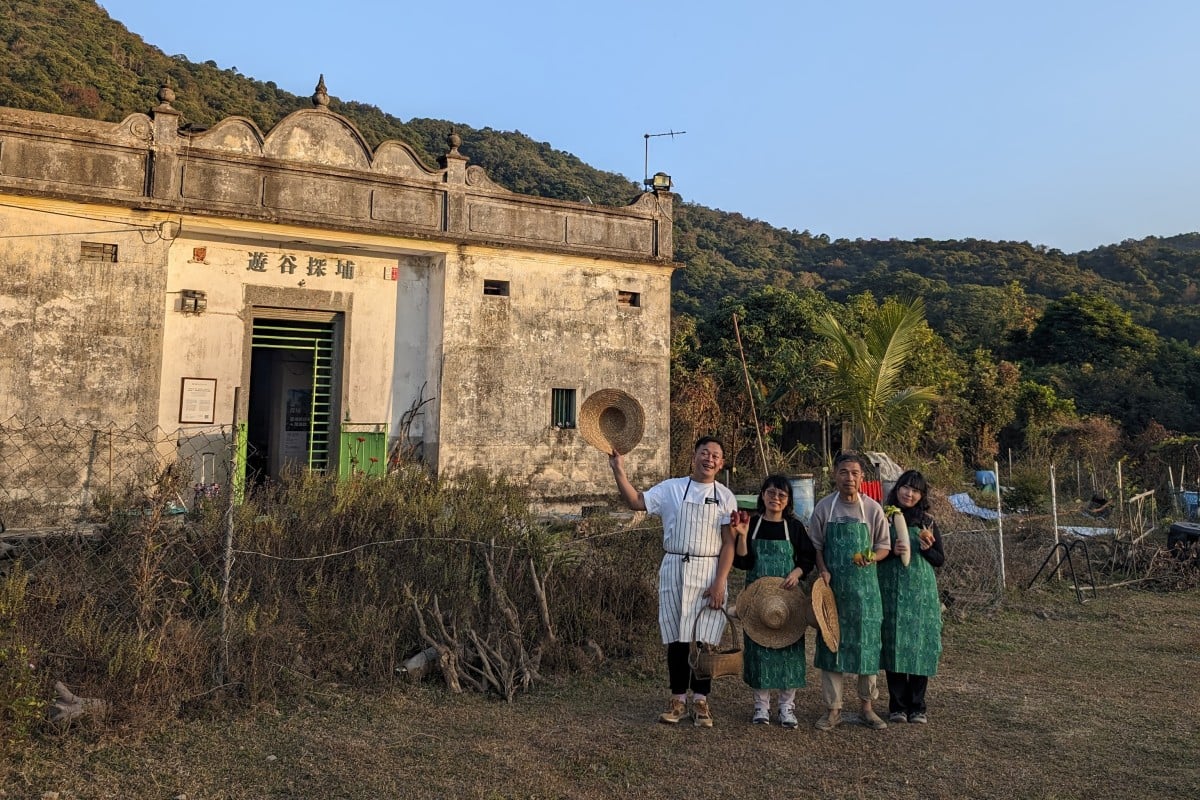
Hakka village invites visitors to taste a change of scenery in Hong Kong with seasonal feasts, sustainable tourism
- Kuk Po, located in the northeastern New Territories, is the focus of projects aimed at revitalising the city’s rural areas while preserving their heritage
- Local conservation group Tourism Innovation Studio is organising farm-to-table dinners to give outsiders a taste of Hakka cuisine
 Actor Joey Leung (from left) worked with Kuk Po villagers Li Suet-mui, Lee Muk-sing and Lee’s daughter Lilian to prepare a seven-course springtime meal. Photo: Handout
Actor Joey Leung (from left) worked with Kuk Po villagers Li Suet-mui, Lee Muk-sing and Lee’s daughter Lilian to prepare a seven-course springtime meal. Photo: HandoutIn Kuk Po – a Hakka village in Hong Kong boasting three centuries of history – two tables of guests were treated to a springtime feast.
Featuring home-grown produce with radish as the main star, this seven-course Hakka dinner began with starters like pickled radish in rice wine jelly and charcoal-grilled glutinous rice turnip cakes, followed by the main courses: yellow rice wine chicken and braised pork belly with pickles.
Part of a sustainable tourism project organised by local conservation group Tourism Innovation Studio, this farm-to-table experience aims to revitalise the city’s rural areas by encouraging visitors to journey off the beaten track.
“Our idea of in-depth tourism is to transform the best things of Hong Kong into a unique travel experience,” said Paul Chan Chi-yuen, chairperson of Hong Kong Community Heritage Foundation Limited, the NGO behind Tourism Innovation Studio.
While tour groups often rush towards Hong Kong’s Instagrammable spots, Chan, who led the project in Kuk Po, believes this merely scratches the city’s surface and misses the meaningful experiences that rural areas offer.
“Hong Kong’s rural areas have tremendous potential for in-depth tourism ... if we aspire to achieve sustainable tourism in Hong Kong and encourage people to stay,” he said, adding that “good tourism” should protect the locale’s unique cultural aspects, not just cater to visitors.
The group’s goal for the year is to create 24 innovative activities featuring Kuk Po and other Hakka villages around Yan Chau Tong in the northeastern New Territories.
A Hongkonger’s quest to revive a remote, 400-year-old Hakka village
The group is holding four themed Hakka feasts to capture Kuk Po’s changes in spring, summer, autumn and winter by using seasonal ingredients. Hosted in the ancestral home of villager Lee Muk-sing, each meal has a limited number of seats to ensure an immersive experience while preserving the village.
Held during the Lantern Festival in February, the dinner was also a recipe exchange between food host and actor Joey Leung Jo-yiu and villagers Lee and Li Suet-mui.
“Preserving the culture of a place is something that we all have a shared responsibility to work on together,” shared Leung, 47.
“When a recipe is exchanged or passed down, it brings back the warmth of life during that time.”
Cultural exchange through food
Before entering Kuk Po, those attending the Lantern Festival dinner also enjoyed a guided tour of nearby town Sha Tau Kok – it was opened in January to visitors with closed area permits, allocated on a quota basis.
These Hongkongers were eager to delve into the heritage of the city’s rural villages.
“The food was cooked in a traditional firewood furnace and prepared by Hakka villagers. Having these two things together makes it a once-in-a-lifetime opportunity for me,” said Wini Tse, one of the 25 participants.
“I was thinking that if I’ve got some money for travelling, why don’t I try exploring Hong Kong?”
Tse said she was impressed by the main courses and the meaning behind them: “After hearing the story behind it – how Hakka people cook it for their daughter-in-law to eat after giving birth – I got to taste it myself. I’m not Hakka, but it was particularly delicious.”
The Kuk Po villagers are excited for Hongkongers to catch this glimpse into Hakka culture. For Li, she is sharing traditions that she has worked hard to preserve.
“At the beginning, I could not make Hakka yellow wine,” the villager pointed out.
“As it is part of traditional Hakka cuisine, I did not want it to be lost. I kept trying and learning, which has led to the delicious taste we experienced now.”
Why historians at We Toast HK want you to look up from your textbook
Leung, who is also a farming enthusiast, added that the dinners were a way to support local farms.
“If we as Hongkongers don’t support local produce, Hong Kong’s farmland will not be protected,” he explained.
He also stressed the importance of preserving the city’s Hakka food culture, especially the traditional recipes that were orally passed down.
“If you’re not fully committed and passionate about preserving this culture, it’s actually quite challenging to open up your own home in this way,” he said. “I have great respect for those who do so.”
The value of sustainable tourism
Yan Chau Tong, named Double Haven in English, has seven Hakka villages that have a rich history dating back to the Qing dynasty. But many Kuk Po residents began leaving in the 1960s. For decades, it was one of nearly 100 forsaken villages across the New Territories.
Before Sha Tau Kok was opened to the public, this area was especially inconvenient for visitors, who had to hike in.
But in recent years, some rural villages have been approved to receive government funding for revitalisation – including the Yan Chau Tong area.
Last year, the Hong Kong Community Heritage Foundation received a grant of HK$3 million to promote sustainable tourism in Yan Chau Tong. When brainstorming events, the first thing that came to Chan’s mind was food because of its power to bring people together.
“Food serves as a universal language, and even if you may not have the strongest interest in history and culture, everyone is naturally drawn to food,” he noted.
Rebuilding the Hakka village of Yim Tin Tsai, once known for its salt collection
According to Chan, travelling could be “a means of communication” through which outsiders come together to interact, learn from each other, and inspire one another.
“I believe travel is a way to share life experiences,” he said. “Therefore, I hope to create a platform where people from outside our city can engage in meaningful exchanges around the dining table.”
He added that travelling to a destination once was not enough “to discover its varying beauty and essence”. Repeated visits facilitate a deeper understanding of rural parts of Hong Kong and its transformations.
“As a city dweller, what strikes me most is how rural villagers have a heightened awareness of seasonal changes. Each season brings different landscapes, diverse foods, unique wisdom, values and special festivals,” he said.
allocated 分配
to give something officially to someone for a specific purpose
ancestral 祖屋
connected with people in your family who lived a long time ago
farm-to-table 從農場到餐桌
a movement to promote serving food that is grown nearby
heightened 提高
describes a feeling that becomes stronger
off the beaten track 偏遠地區
far away from other people and houses
revitalise 振興
to make something stronger, more active or more healthy
scratches the surface (of something) 只觸及表面的問題
to understand only a small part of a subject
sustainable tourism 可持續旅遊
an approach to attracting visitors that also addresses the needs of the local people and environment
